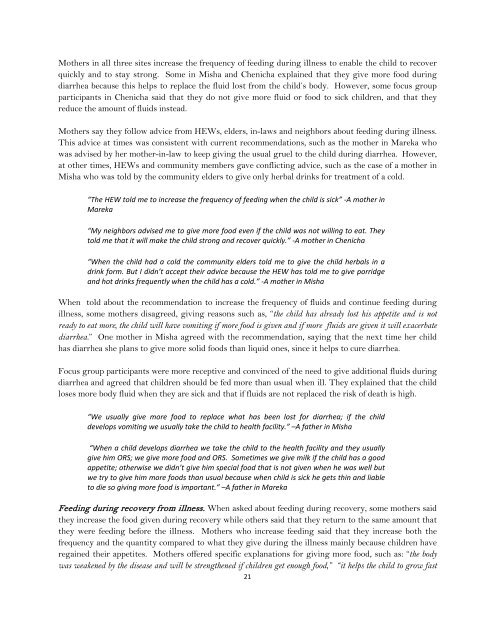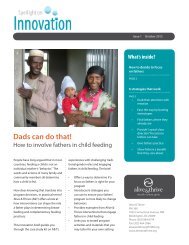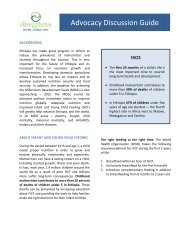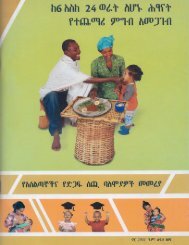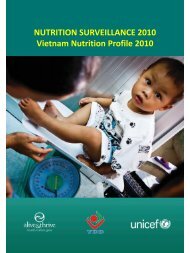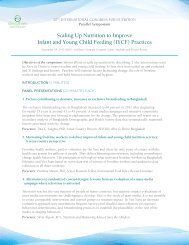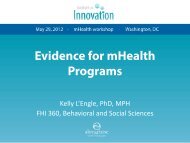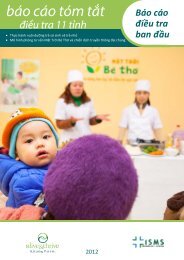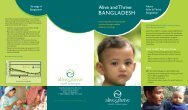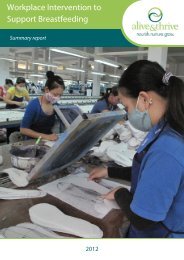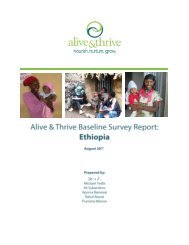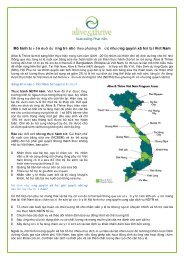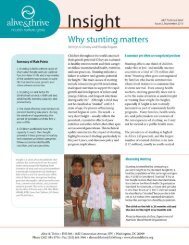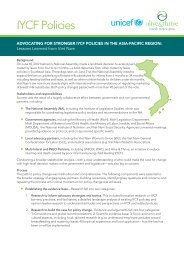IYCF Practices, Beliefs, and Influences in SNNP ... - Alive & Thrive
IYCF Practices, Beliefs, and Influences in SNNP ... - Alive & Thrive
IYCF Practices, Beliefs, and Influences in SNNP ... - Alive & Thrive
Create successful ePaper yourself
Turn your PDF publications into a flip-book with our unique Google optimized e-Paper software.
Mothers <strong>in</strong> all three sites <strong>in</strong>crease the frequency of feed<strong>in</strong>g dur<strong>in</strong>g illness to enable the child to recoverquickly <strong>and</strong> to stay strong. Some <strong>in</strong> Misha <strong>and</strong> Chenicha expla<strong>in</strong>ed that they give more food dur<strong>in</strong>gdiarrhea because this helps to replace the fluid lost from the child’s body. However, some focus groupparticipants <strong>in</strong> Chenicha said that they do not give more fluid or food to sick children, <strong>and</strong> that theyreduce the amount of fluids <strong>in</strong>stead.Mothers say they follow advice from HEWs, elders, <strong>in</strong>-laws <strong>and</strong> neighbors about feed<strong>in</strong>g dur<strong>in</strong>g illness.This advice at times was consistent with current recommendations, such as the mother <strong>in</strong> Mareka whowas advised by her mother-<strong>in</strong>-law to keep giv<strong>in</strong>g the usual gruel to the child dur<strong>in</strong>g diarrhea. However,at other times, HEWs <strong>and</strong> community members gave conflict<strong>in</strong>g advice, such as the case of a mother <strong>in</strong>Misha who was told by the community elders to give only herbal dr<strong>in</strong>ks for treatment of a cold.“The HEW told me to <strong>in</strong>crease the frequency of feed<strong>in</strong>g when the child is sick” -A mother <strong>in</strong>Mareka“My neighbors advised me to give more food even if the child was not will<strong>in</strong>g to eat. Theytold me that it will make the child strong <strong>and</strong> recover quickly.” -A mother <strong>in</strong> Chenicha“When the child had a cold the community elders told me to give the child herbals <strong>in</strong> adr<strong>in</strong>k form. But I didn’t accept their advice because the HEW has told me to give porridge<strong>and</strong> hot dr<strong>in</strong>ks frequently when the child has a cold.” -A mother <strong>in</strong> MishaWhen told about the recommendation to <strong>in</strong>crease the frequency of fluids <strong>and</strong> cont<strong>in</strong>ue feed<strong>in</strong>g dur<strong>in</strong>gillness, some mothers disagreed, giv<strong>in</strong>g reasons such as, “the child has already lost his appetite <strong>and</strong> is notready to eat more, the child will have vomit<strong>in</strong>g if more food is given <strong>and</strong> if more fluids are given it will exacerbatediarrhea.” One mother <strong>in</strong> Misha agreed with the recommendation, say<strong>in</strong>g that the next time her childhas diarrhea she plans to give more solid foods than liquid ones, s<strong>in</strong>ce it helps to cure diarrhea.Focus group participants were more receptive <strong>and</strong> conv<strong>in</strong>ced of the need to give additional fluids dur<strong>in</strong>gdiarrhea <strong>and</strong> agreed that children should be fed more than usual when ill. They expla<strong>in</strong>ed that the childloses more body fluid when they are sick <strong>and</strong> that if fluids are not replaced the risk of death is high.“We usually give more food to replace what has been lost for diarrhea; if the childdevelops vomit<strong>in</strong>g we usually take the child to health facility.” –A father <strong>in</strong> Misha“When a child develops diarrhea we take the child to the health facility <strong>and</strong> they usuallygive him ORS; we give more food <strong>and</strong> ORS. Sometimes we give milk if the child has a goodappetite; otherwise we didn’t give him special food that is not given when he was well butwe try to give him more foods than usual because when child is sick he gets th<strong>in</strong> <strong>and</strong> liableto die so giv<strong>in</strong>g more food is important.” –A father <strong>in</strong> MarekaFeed<strong>in</strong>g dur<strong>in</strong>g recovery from illness. When asked about feed<strong>in</strong>g dur<strong>in</strong>g recovery, some mothers saidthey <strong>in</strong>crease the food given dur<strong>in</strong>g recovery while others said that they return to the same amount thatthey were feed<strong>in</strong>g before the illness. Mothers who <strong>in</strong>crease feed<strong>in</strong>g said that they <strong>in</strong>crease both thefrequency <strong>and</strong> the quantity compared to what they give dur<strong>in</strong>g the illness ma<strong>in</strong>ly because children haverega<strong>in</strong>ed their appetites. Mothers offered specific explanations for giv<strong>in</strong>g more food, such as: “the bodywas weakened by the disease <strong>and</strong> will be strengthened if children get enough food,” “it helps the child to grow fast21


